What will the protests of 25th October in Iraq look like?
On the first of October, Iraq witnessed enormous protests against the government and the political elite in this country. Later, the prime minister, Adel Abdul Mahdi, announced many reform packages. He also declared that a committee would be established to investigate the actions of violence executed against the protesters. No one believed in these governmental procedures. Thus, a new wave of protests will engulf Iraq's big cities on the 25th of October.
I think that the rules of the game have changed dramatically. A new picture is now being formed for Iraq. Socially, the generation of smartphones can achieve many important things to expose corrupt politicians. Iraq will not remain in the hands of such politicians forever. This is one of the most vital convictions that will emerge in these protests.
The protests of October have domestic reasons. The foreign factors have nothing to do in this regard. The failed economic policies and corruption are the most causes of driving the demonstrators to refuse this political system. This is the story that these parties do not like to admit.
The protests of October in Iraq will reshape the relations between the society and the political elite. In the end, a new Iraqi mainstream will be created to affirm that Iraqis will not allow the others to swallow their country.
The demonstrations that happened at the beginning of October proved that a new generation of protesters was looking for a new life and a secure future. That number of young protesters was large according to the population standards in many Iraqi cities, especially in Baghdad. If the Sadrist movement joins the protests as expected, the number of protesters will be extremely enormous. This will affect the political outcomes of these social movements.
On the 25th of October, it will be difficult for the militia to repeat the scene of violence that occurred in the protests at the beginning of October. Security leaders are fearful that they will be victims of unfair sentences that seek to present them as implicated figures in the violence, instead of the senior state officials. Hence, they will not open fire against the innocent youth provided that these protesters stay in the protest areas.
However, this does not refute another important hypothesis: in case the crisis erupts, we may witness street fighting between opposing Shiite factions, one of which follows the Sadrist movement (Peace Brigades) and the others follow the Popular Mobilization Forces. This is the worst-case scenario for which things might negatively develop. Thus, Iraqi political parties must reach a quick settlement of this crisis. This cannot be done without excluding all the unofficial military groups from the protest theater.
Baghdad is the center of political decision-making in Iraq. Here all ministries are concentrated. In this place, the headquarters of the main parties are also concentrated in different districts. Geopolitically, the Green Zone is also located in the capital. Angry protesters will rush to topple the parties' symbolism by attacking all these important centers. For sure, this would be interpreted as an act of political revenge by the other rivals. This will distort the protests. Protests must stay peaceful. They must work on rationalizing their behaviour to reach their fair goals.
There might be events of burning and looting targeting the public and private property by some of the widespread organized crime gangs in Baghdad. People fear the crisis will continue for days; therefore, they have started to accumulate food and other essentials to sustain their families' life. Iraqis are used to this behavior in the crucial crises, as what happened in 1990 and 2003.
A widespread rejection has risen against the government reports about violence and the decisions it has taken to address protesters' demands. There is a concrete refusal entrenched in the subconscious mind of the protesters. This means that the government on the 25th of October will fall psychologically and will no longer be able to regain confidence by the general public. Its psychological fall precedes its realistic fall, which has become just a matter of time.
In these new protests, it is assumed that the security forces will publish statements confirming that they do not target peaceful demonstrators and will protect state institutions and private property from any actions of looting or stealing.
This task will receive widely public interest because it forms an acceptable and welcome role by the community. In return, the performance of the armed forces operating outside the state's control will be hugely condemned. Iraqi society still respects the official army, especially after its major battles against ISIS. this will lead to more isolation to the undisciplined factions that do not obey the Iraqi governmental orders.
The Iraqi people will ask their government to fight corruption, bring the big corrupt politicians to justice, disrupt parliament, call for early elections, amend the election law, offer job opportunities, and to apply the social justice's policies. The current government is politically constrained and unable to meet these demands. The best solution that will decrease the angry of the protesters is the issuance of arrest warrants for the senior leaders accused of corruption as a first step that could pave the way to achieve the rest of the demands. Without this, there will be more popular mechanisms to force the government to resign.
Diyari Salih is an Iraqi academic with a Ph.D. in Political Geography from the University of Baghdad and a Post-Doctorate in International Relations from the University of Warsaw. His research focuses on geopolitical issues in Iraq. He tweets at @DiyariFaily







